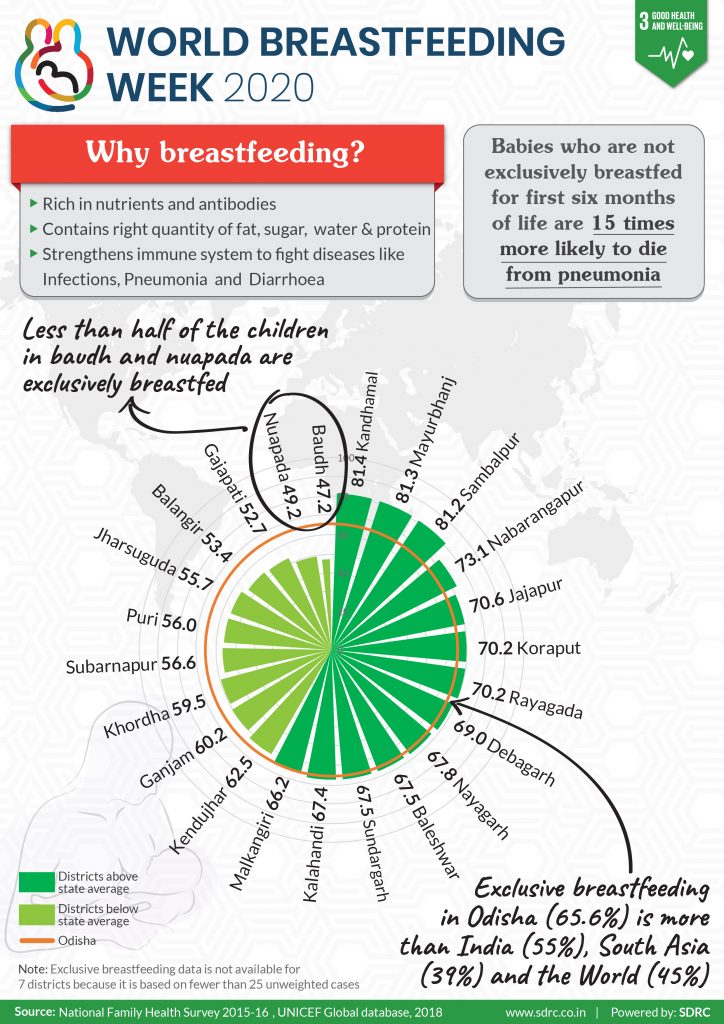Exclusive breastfeeding from the birth of a child to the next two years is crucial to combat malnutrition. Early initiation of breastfeeding:
- Prevents 20% of neonatal deaths
- Provides key nutrients
- Increases children’s I.Q.
- Protects from deadly and non-communicable diseases
- Prevents cancer in mothers
- Fosters growth and development
World Breastfeeding Week is celebrated every first week of August to promote exclusive breastfeeding for the first six months of birth and raise awareness on its benefits. This year’s theme is “support breastfeeding for a healthier planet” and precautionary measures for the global pandemic.
Exclusive breastfeeding of children under six months will help achieve numerous Sustainable Development Goals (SDGs) – SDG 2 (improved nutrition), SDG 3 (prevention of child mortality and decrease of the risk of non-communicable diseases), and SDG 4 (cognitive development and education).
Status of breastfeeding in India and Odisha
According to the National Family and Health Survey 2015-16 (NFHS-4), 78.9% of child births in India happen in a health facility, while the same stood at 85.4% in Odisha.
Although a child born in a health facility must be breastfed with an hour of birth, the percentage is low at both national and state level. Only 41.5% children in India were breastfed within an hour of birth, whereas it is 69% in Odisha.
Although exclusive breastfeeding during the first six months compared to within an hour of birth increased in India to 54.9%, it dropped to 65.6% in Odisha. Less than half of children are exclusively breastfed in two districts of Odisha – Baudh and Nuapada.
Some challenges associated with breastfeeding
Nutritional and health status of a mother: A mother who is anaemic with inadequate nutrition or underlying health causes may face several problems while breastfeeding. More than half of Odisha’s women population is anaemic.
Wrong beliefs associated with colostrum: Colostrum, also called ‘babies first vaccine’, is the first milk secreted by a woman at the time of childbirth. It has the vital nutrients and components to build immunity and prevent various illnesses. In many cultures, however, mothers are advised to avoid feeding baby colostrum because of the wrong beliefs attached to it.
Need for support: Though breastfeeding is a natural process, mothers need support to initiate and sustain breastfeeding. They experience various barriers, which could be emotional, health related, personal, or even financial. Young mothers may shy away from feeding their kid due to lack of confidence, embarrassment, and other emotional causes.
Postpartum depression and breastfeeding: Many emerging studies suggest that there exists a connection between breastfeeding and postpartum depression. Mothers who experience postpartum depression or anxiety or any other mental stress are more likely to face problems regarding breastfeeding. It may affect the duration of breastfeeding or the rate of feeding the child which will in turn affect the child’s development.
Inadequate public nursing rooms: Lack of public nursing rooms pose a huge challenge for mothers of new-borns. At times they are forced to breastfeed their children in bathrooms or toilets of public places. In India, there exists a stigma related to nursing children out in the public.
Government Interventions to promote breastfeeding
National Breastfeeding Promotion Programme – MAA: The Indian government launched a National Breastfeeding Promotion Programme, under the name of mothers’ absolute affection (MAA) to ensure awareness among all, particularly mothers, on the benefits of breastfeeding. Under the program, nurses in government hospitals, Auxiliary Nurse Mid-wives (ANM), and Accredited Social Health Activists (ASHA) have been trained to provide counselling support and key information to mothers for breastfeeding.
The Pradhan Mantri Surakshit Matritva Abhiyan: Launched by the Ministry of Health & Family Welfare (MoHFW), the program aims to provide assured, comprehensive, and quality antenatal care, free of cost, universally to all pregnant women on the 9th of every month. PMSMA guarantees a minimum package of antenatal care services to women in their 2nd / 3rd trimesters of pregnancy at designated government health facilities. In 2019, Odisha emerged as one of the top five states to benefit from the program as 8,702 women received free ante-natal care in that year alone.
IAP HealthPhone: In June 2018, the Women and Child Development Ministry launched the ‘IAP HealthPhone’ program to spread awareness about breastfeeding and the importance of a balanced diet.
Maternity Leave Benefits: The Indian government has renewed focus on implementing the Maternity Benefit Act, 1961 which guarantees three months’ leave with wages for pregnant employees.
What are the best practices around promotion of breastfeeding?
Breastfeeding Rooms in Tamil Nadu’s Public Places: In 2018, Tamil Nadu launched more than 300 breastfeeding rooms in public spots like the Chennai Mofussil Bus Terminus (CMBT). Each air-conditioned room can be used by eight mothers at a time. To help mothers, the state government also appointed nurses in the rooms.
PMCH’s special room: The Patna Medical College and Hospital (PMCH) has created a special room to enable its staff to breastfeed their infants while on the job. Apart from that, the hospital is also looking to implement the six-month maternity leave rule.
Tamil Nadu’s phone helpline: Not all mothers have access to specialized assistance and facilities. Considering this, the Tamil Nadu government has launched a phone helpline to support breastfeeding and educate women in rural areas. Through that, they can receive advice on nursing, nutrition and seek support on their babies’ health.




